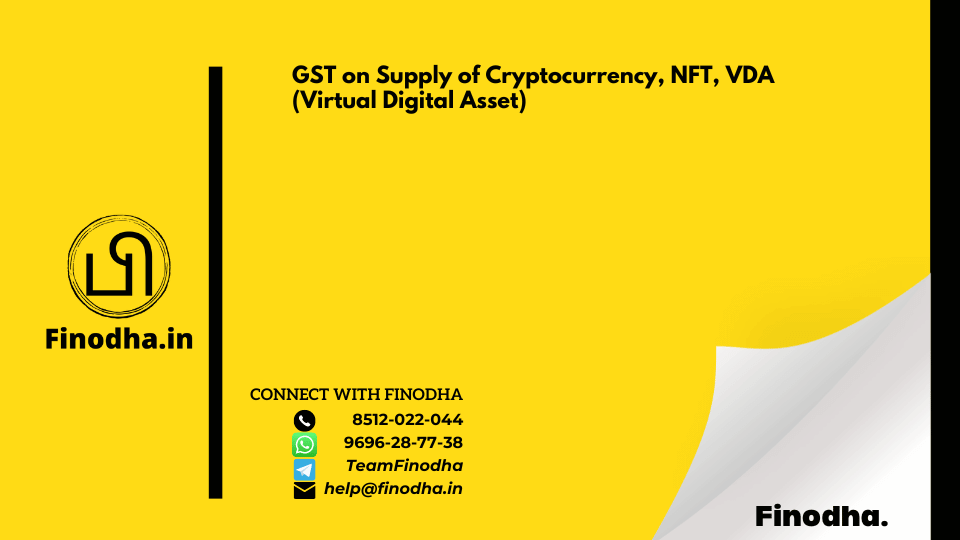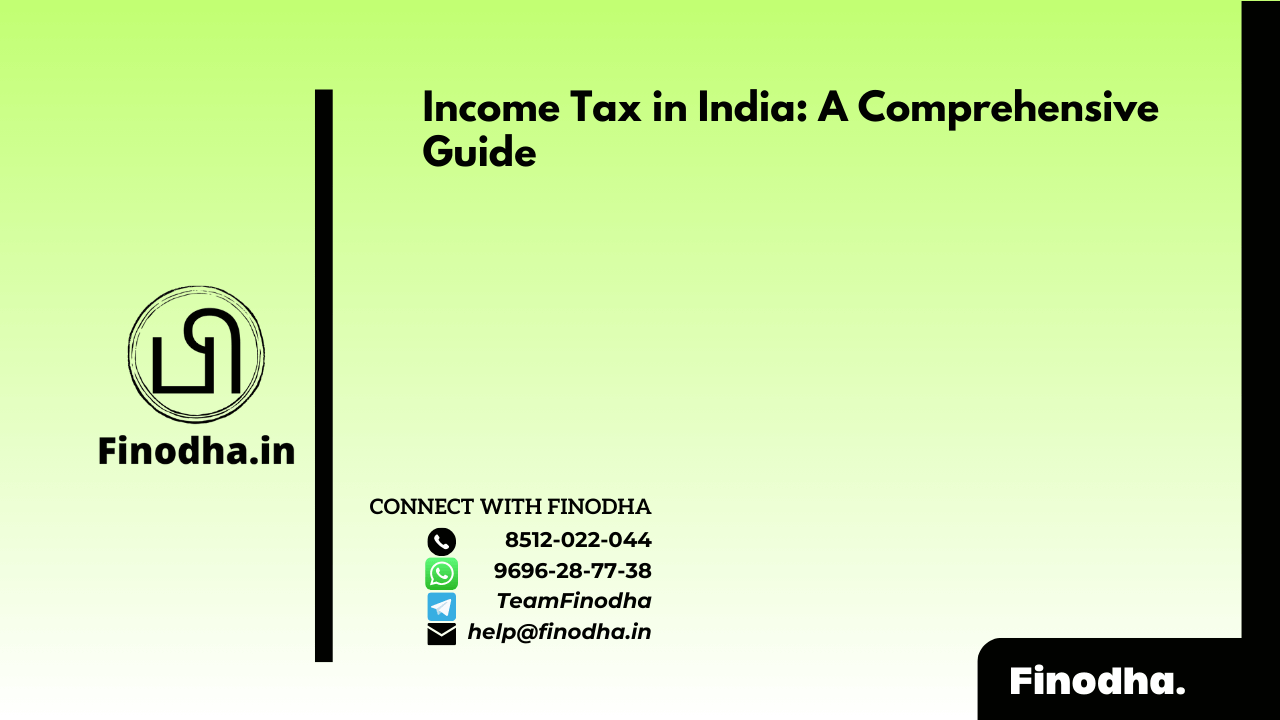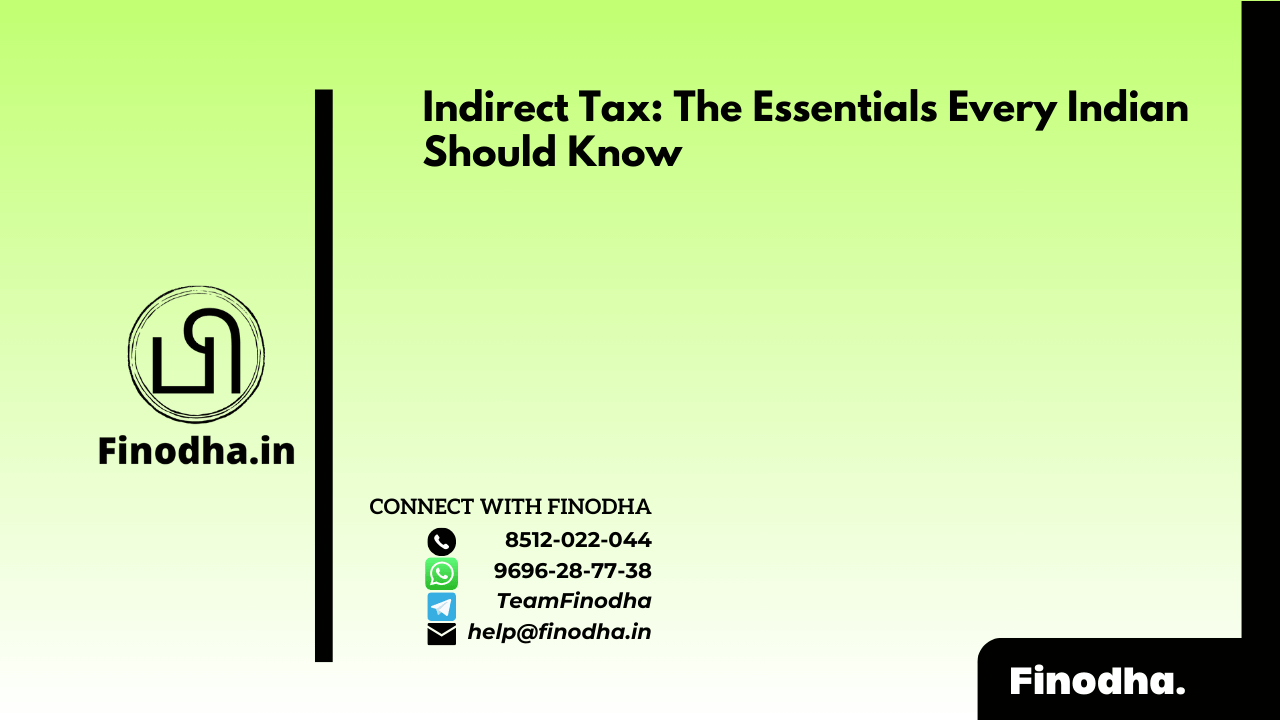Important Keyword: GST, Tax on Cryptocurrency, Tax on NFT, Tax on VDA.
Table of Contents
GST on Supply of Cryptocurrency, NFT, VDA (Virtual Digital Asset)
Cryptocurrency and other digital assets have been the subject of extensive discussion among traders for many years. In the 2022 Budget, the finance minister provided clarity by classifying cryptocurrency and similar assets as Virtual Digital Assets (VDAs). Here’s a simplified overview of how these assets are taxed and the potential applicability of GST on them.
Income Tax on Cryptocurrency and Other Digital Assets
Tax Rate: Income from cryptocurrencies, NFTs, and other VDAs is taxed at a flat rate of 30% under Section 115BBH of the Income Tax Act. This high rate standardizes the tax treatment of digital assets across the board.
TDS on Transfers: A 1% Tax Deducted at Source (TDS) is applied to the transfer of cryptocurrencies under Section 194S.
What is a cryptocurrency or digital asset under GST Act?
Cryptocurrency and digital assets have been a topic of much discussion among traders and regulators. The 2022 Budget provided some clarity by defining these assets as Virtual Digital Assets (VDAs). Here’s an easy-to-understand guide on how these assets are taxed and the potential application of Goods and Services Tax (GST).
Income Tax on Cryptocurrency and Digital Assets
Tax Rate: As per Section 115BBH of the Income Tax Act, income from cryptocurrencies, NFTs, and other VDAs is taxed at a flat rate of 30%. This uniform rate simplifies the tax process for digital assets.
TDS on Transfers: Section 194S mandates a 1% Tax Deducted at Source (TDS) on the transfer of cryptocurrencies. This helps in tracking and ensuring compliance with tax regulations.
Is the sale of cryptocurrency taxable under GST?
With the growing popularity of cryptocurrencies and digital assets, understanding their classification and tax implications under the GST Act is essential. Let’s delve into whether VDAs can be classified as goods or services according to the GST Act, and what that means for taxation.
Definitions Under the GST Act
Goods: As per Section 2(52), goods are defined as any movable property, excluding money and securities.
Services: The definition of services encompasses anything other than goods, money, and securities. However, services include the conversion of money from one form to another, such as through brokerage or commission.
Money: Money refers to legal tender, foreign currency, cheques, electronic remittances, or any instrument recognized by the Reserve Bank of India (RBI) for settling obligations.
Securities: Securities cover bonds, debentures, shares, derivatives, government securities, or similar financial instruments.
Classification of Cryptocurrency under the GST Act
Virtual Digital Assets (VDA), including cryptocurrencies, cannot be classified as money or securities as per the definitions provided by the GST Act. Additionally, VDAs do not fit the definition of services.
Movable Property: Since VDAs can be transferred and traded, they are considered movable property. Therefore, they can be classified as goods under the GST Act.
Taxability of Crypto Transactions Under GST
GST Applicability:
- Sale of Cryptocurrency: The sale of VDAs like cryptocurrency and NFTs is not listed under Schedule III of the GST Act, which means these transactions are not exempt from GST. Thus, the sale of VDAs is taxable under the GST Act.
- Services by Crypto Exchanges: Services provided by cryptocurrency exchanges are taxable. Exchanges are required to collect GST from traders and remit it to the GST department. This GST is usually included in the trading fees charged to users.
Reverse Charge Mechanism:
- If a crypto exchange is located outside India, the place of supply of services is considered to be the location of the recipient (i.e., the trader in India). In such cases, the trader is liable to pay GST on a reverse charge basis.
Who needs to pay GST on supply of cryptocurrency and digital assets?
The rapid growth of cryptocurrency trading has brought forth various tax implications, including the applicability of GST. Here, we’ll explore the GST responsibilities for sellers of cryptocurrency and digital assets, focusing on registration, tax collection, and claiming Input Tax Credit (ITC).
GST Collection on Cryptocurrency Sales
Seller Responsibilities:
- GST Collection: Sellers of cryptocurrency or digital assets must collect GST from buyers at the time of sale.
- Deposit GST: The collected GST must be deposited with the government.
HSN Code and GST Rate for Digital Assets
- HSN Code: As there is no specific HSN Code for digital assets, HSN Code 960899 under the category ‘others’ can be used.
- GST Rate: The applicable tax rate for this HSN Code is 18%.
GST Registration Requirements
Threshold for Registration:
- Aggregate Turnover: A seller must register under the GST Act if their aggregate turnover exceeds INR 40 lakhs during a financial year.
- Post-Registration Obligations: Once registered, the seller must collect and remit GST on each transaction involving the sale of cryptocurrency or digital assets.
Input Tax Credit (ITC)
Eligibility for ITC:
- GST Paid on Purchases: Sellers can claim ITC for the GST paid on purchasing cryptocurrency, NFTs, or other VDAs.
- GST on Business Expenses: ITC can also be claimed for GST paid on business-related services and expenses, such as consultancy services, software expenses, broker commissions, and mining costs.
Compliance Amidst Ambiguity
Current Scenario:
- Lack of Specific Guidelines: The GST department has not yet provided specific guidelines on the taxability of cryptocurrency and digital assets.
- Existing Provisions: Until there is a clear directive from the GST Council, crypto traders and exchanges should adhere to the current GST provisions.
Key Points for Crypto Traders and Sellers
- GST Collection: Collect GST at the rate of 18% on the sale of cryptocurrency using HSN Code 960899.
- GST Registration: Ensure GST registration if the annual turnover exceeds INR 40 lakhs.
- ITC Claims: Claim Input Tax Credit for GST paid on relevant purchases and business expenses.
- Compliance: Follow existing GST rules diligently to avoid legal issues until specific guidelines are issued by the GST Council.
By understanding and adhering to these GST requirements, sellers and traders of cryptocurrency can navigate the current tax landscape more effectively, ensuring compliance and optimizing their tax positions.
Read More: Tax on gifting Crypto, NFT, VDA in India
Web Stories: Tax on gifting Crypto, NFT, VDA in India
Official Income Tax Return filing website: https://incometaxindia.gov.in/




